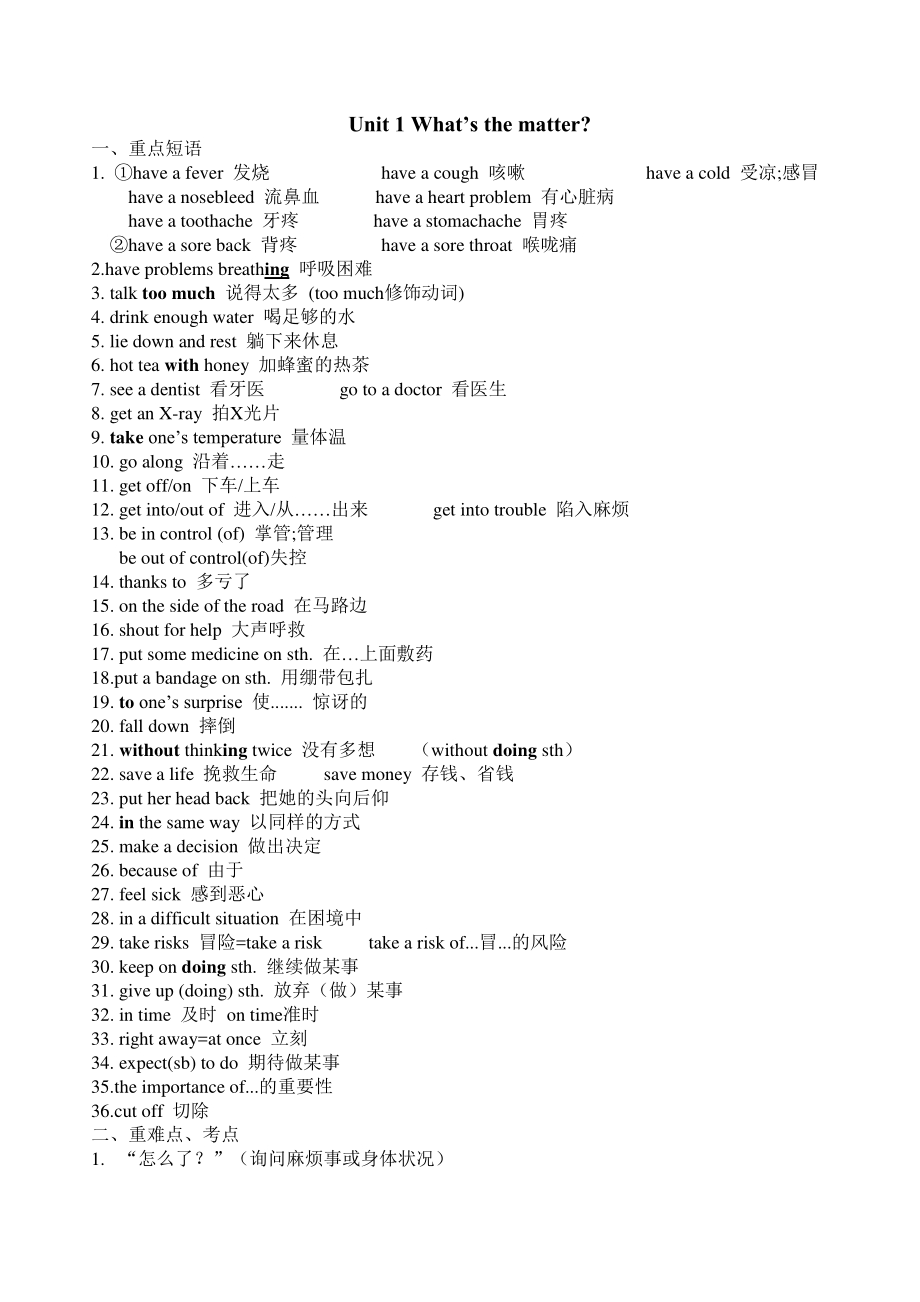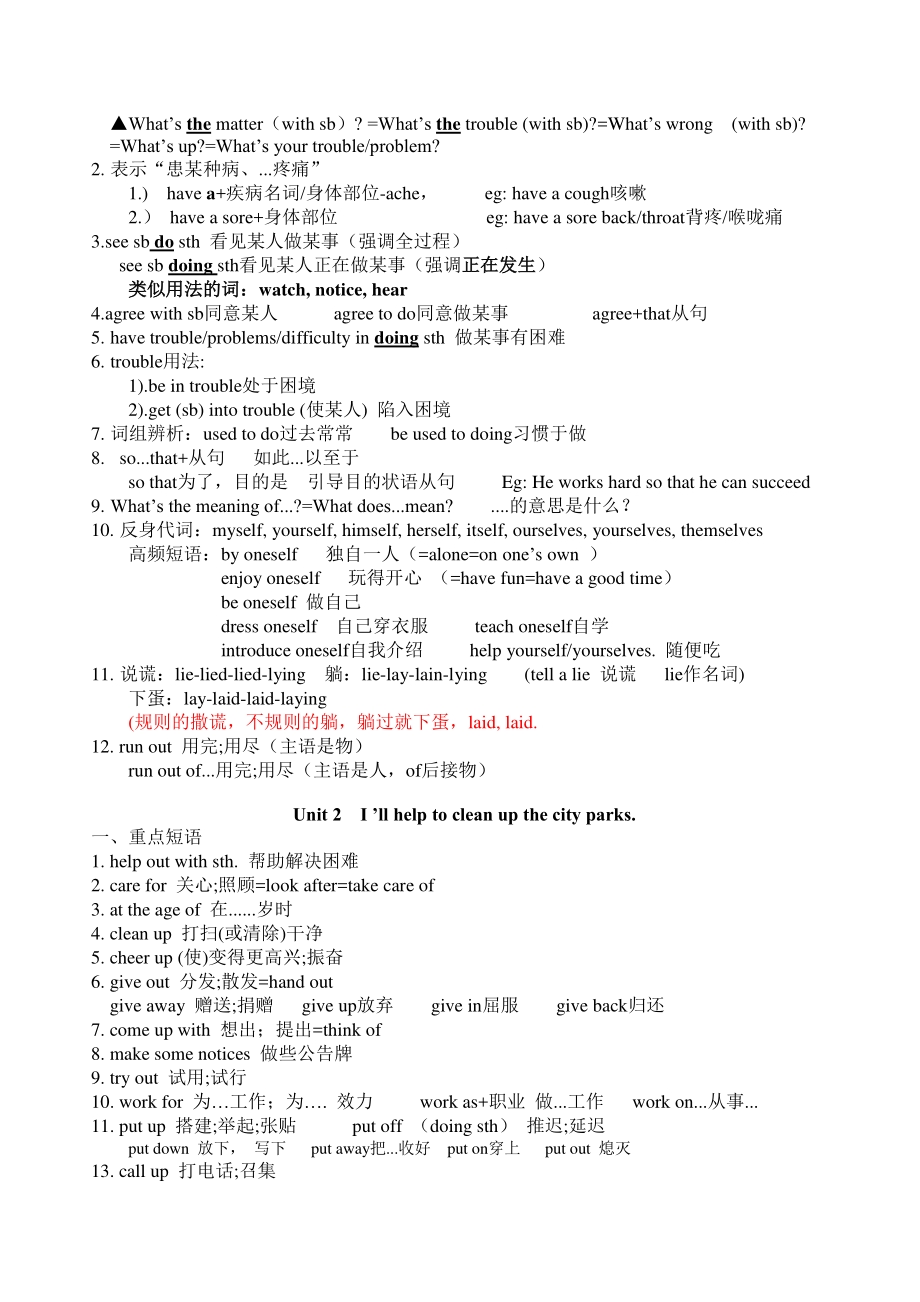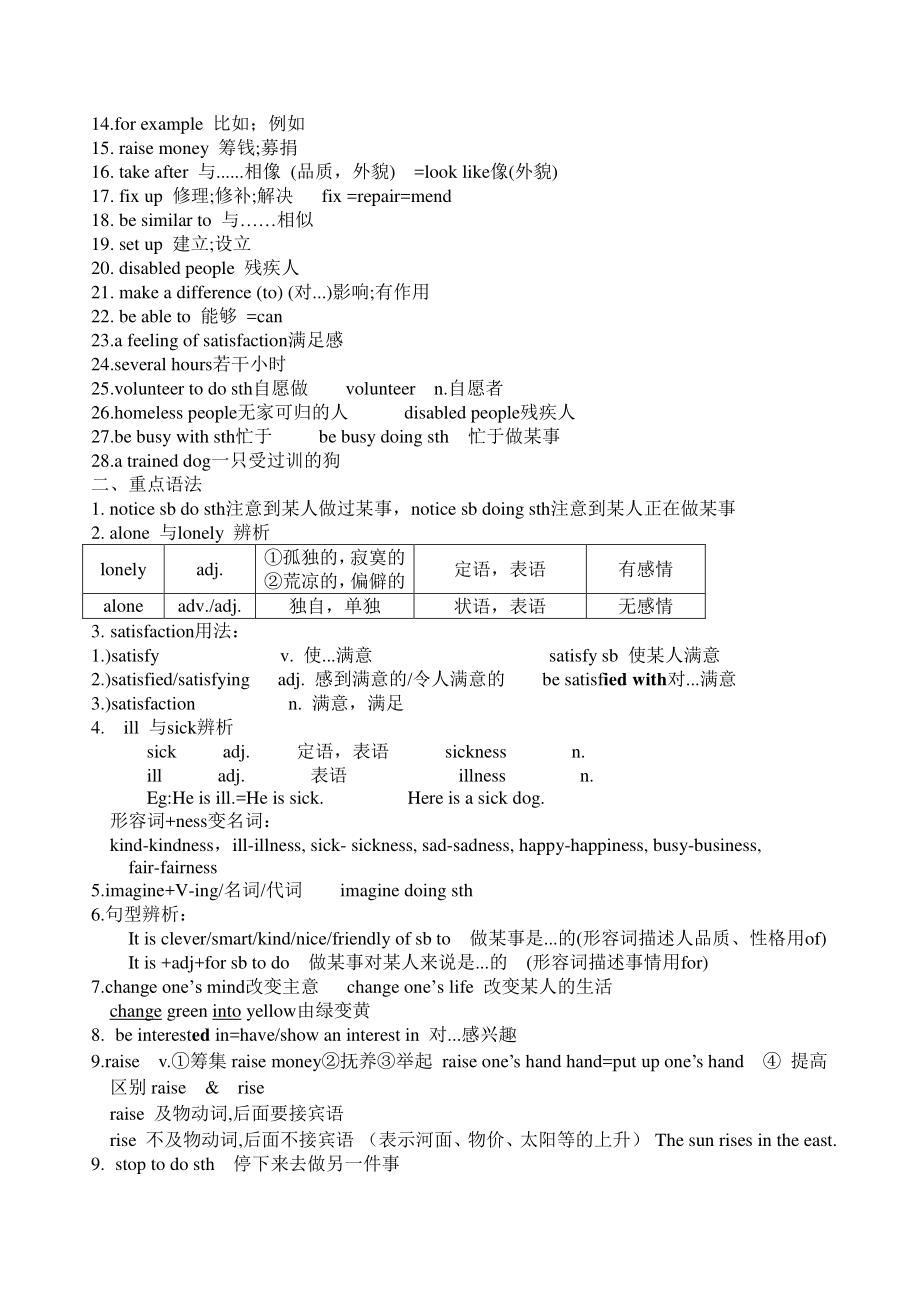 2020-2021学年人教版英语八年级下册期末复习考点总结
2020-2021学年人教版英语八年级下册期末复习考点总结
《2020-2021学年人教版英语八年级下册期末复习考点总结》由会员分享,可在线阅读,更多相关《2020-2021学年人教版英语八年级下册期末复习考点总结(16页珍藏版)》请在七七文库上搜索。
1、 Unit 1 Whats the matter? 一、重点短语 1. have a fever 发烧 have a cough 咳嗽 have a cold 受凉;感冒 have a nosebleed 流鼻血 have a heart problem 有心脏病 have a toothache 牙疼 have a stomachache 胃疼 have a sore back 背疼 have a sore throat 喉咙痛 2.have problems breathing 呼吸困难 3. talk too much 说得太多 (too much修饰动词) 4. drink enoug
2、h water 喝足够的水 5. lie down and rest 躺下来休息 6. hot tea with honey 加蜂蜜的热茶 7. see a dentist 看牙医 go to a doctor 看医生 8. get an X-ray 拍X光片 9. take ones temperature 量体温 10. go along 沿着走 11. get off/on 下车/上车 12. get into/out of 进入/从出来 get into trouble 陷入麻烦 13. be in control (of) 掌管;管理 be out of control(of)失控
3、14. thanks to 多亏了 15. on the side of the road 在马路边 16. shout for help 大声呼救 17. put some medicine on sth. 在上面敷药 18.put a bandage on sth. 用绷带包扎 19. to ones surprise 使. 惊讶的 20. fall down 摔倒 21. without thinking twice 没有多想 (without doing sth) 22. save a life 挽救生命 save money 存钱、省钱 23. put her head back 把
4、她的头向后仰 24. in the same way 以同样的方式 25. make a decision 做出决定 26. because of 由于 27. feel sick 感到恶心 28. in a difficult situation 在困境中 29. take risks 冒险=take a risk take a risk of.冒.的风险 30. keep on doing sth. 继续做某事 31. give up (doing) sth. 放弃(做)某事 32. in time 及时 on time准时 33. right away=at once 立刻 34. ex
5、pect(sb) to do 期待做某事 35.the importance of.的重要性 36.cut off 切除 二、重难点、考点 1. “怎么了?”(询问麻烦事或身体状况) Whats the matter(with sb)? =Whats the trouble (with sb)?=Whats wrong (with sb)? =Whats up?=Whats your trouble/problem? 2. 表示“患某种病、.疼痛” 1.) have a+疾病名词/身体部位-ache, eg: have a cough咳嗽 2.) have a sore+身体部位 eg: ha
6、ve a sore back/throat背疼/喉咙痛 3.see sb do sth 看见某人做某事(强调全过程) see sb doing sth看见某人正在做某事(强调正在发生正在发生) 类似用法的词:类似用法的词:watch, notice, hear 4.agree with sb同意某人 agree to do同意做某事 agree+that从句 5. have trouble/problems/difficulty in doing sth 做某事有困难 6. trouble用法: 1).be in trouble处于困境 2).get (sb) into trouble (使某
7、人) 陷入困境 7. 词组辨析:used to do过去常常 be used to doing习惯于做 8. so.that+从句 如此.以至于 so that为了,目的是 引导目的状语从句 Eg: He works hard so that he can succeed 9. Whats the meaning of.?=What does.mean? .的意思是什么? 10. 反身代词:myself, yourself, himself, herself, itself, ourselves, yourselves, themselves 高频短语:by oneself 独自一人(=alo
8、ne=on ones own ) enjoy oneself 玩得开心 (=have fun=have a good time) be oneself 做自己 dress oneself 自己穿衣服 teach oneself自学 introduce oneself自我介绍 help yourself/yourselves. 随便吃 11. 说谎:lie-lied-lied-lying 躺:lie-lay-lain-lying (tell a lie 说谎 lie作名词) 下蛋:lay-laid-laid-laying (规则的撒谎,不规则的躺,躺过就下蛋,laid, laid. 12. ru
9、n out 用完;用尽(主语是物) run out of.用完;用尽(主语是人,of后接物) Unit 2 I ll help to clean up the city parks. 一、重点短语 1. help out with sth. 帮助解决困难 2. care for 关心;照顾=look after=take care of 3. at the age of 在.岁时 4. clean up 打扫(或清除)干净 5. cheer up (使)变得更高兴;振奋 6. give out 分发;散发=hand out give away 赠送;捐赠 give up放弃 give in屈服
10、 give back归还 7. come up with 想出;提出=think of 8. make some notices 做些公告牌 9. try out 试用;试行 10. work for 为工作;为. 效力 work as+职业 做.工作 work on.从事. 11. put up 搭建;举起;张贴 put off (doing sth) 推迟;延迟 put down 放下, 写下 put away把.收好 put on穿上 put out 熄灭 13. call up 打电话;召集 14.for example 比如;例如 15. raise money 筹钱;募捐 16.
11、take after 与.相像 (品质,外貌) =look like像(外貌) 17. fix up 修理;修补;解决 fix =repair=mend 18. be similar to 与相似 19. set up 建立;设立 20. disabled people 残疾人 21. make a difference (to) (对.)影响;有作用 22. be able to 能够 =can 23.a feeling of satisfaction满足感 24.several hours若干小时 25.volunteer to do sth自愿做 volunteer n.自愿者 26.h
12、omeless people无家可归的人 disabled people残疾人 27.be busy with sth忙于 be busy doing sth 忙于做某事 28.a trained dog一只受过训的狗 二、重点语法 1. notice sb do sth注意到某人做过某事,notice sb doing sth注意到某人正在做某事 2. alone 与lonely 辨析 lonely adj. 孤独的, 寂寞的 荒凉的, 偏僻的 定语,表语 有感情 alone adv./adj. 独自,单独 状语,表语 无感情 3. satisfaction用法: 1.)satisfy v.
13、 使.满意 satisfy sb 使某人满意 2.)satisfied/satisfying adj. 感到满意的/令人满意的 be satisfied with对.满意 3.)satisfaction n. 满意,满足 4. ill 与sick辨析 sick adj. 定语,表语 sickness n. ill adj. 表语 illness n. Eg:He is ill.=He is sick. Here is a sick dog. 形容词+ness变名词: kind-kindness,ill-illness, sick- sickness, sad-sadness, happy-ha
14、ppiness, busy-business, fair-fairness 5.imagine+V-ing/名词/代词 imagine doing sth 6.句型辨析: It is clever/smart/kind/nice/friendly of sb to 做某事是.的(形容词描述人品质、性格用of) It is +adj+for sb to do 做某事对某人来说是.的 (形容词描述事情用for) 7.change ones mind改变主意 change ones life 改变某人的生活 change green into yellow由绿变黄 8. be interested
15、in=have/show an interest in 对.感兴趣 9.raise v.筹集 raise money抚养举起 raise ones hand hand=put up ones hand 提高 区别 raise 总是 21.share the housework 分担家务 22.in surprise 惊讶地 23. get something to drink 拿点喝的东西 24.hang out with sb. 与某人闲逛 26. get sth. wet 使某物弄湿 27. hate to do sth. 讨厌做某事 28. make sb. do sth. 使某人做某事
16、 29.a waste of time浪费时间 (waste v.浪费 用法与spend相同) 30. mind doing sth. 介意做某事 31. depend on依赖;依靠 32. develop childrens independence发展孩子的独立性 33. do ones part in (doing ) sth.做某人分内的事 二、重点语法、考点 1.Could you please (not) do sth ?用于提出请求,希望得到对方肯定回答,语气较委婉。 肯定回答:Sure./ Of course./ Certainly./No problem. 否定回答:Sor
17、ry , I cant. / Im afraid I cant. 2. (1)neither adv 也不 I dont like this dress. 我不喜欢这件连衣裙。 Neither / Nor do I. 我也不喜欢。 【注意】肯定句:He likes beef.-So do I. 我也喜欢。 (2) neither nor 既不也不, 连接两个词做主语,谓语动词遵循就近原则就近原则 Neither Tom nor I am a student (3) neither 作代词表示“两个都不”,neither of.作主语时,谓语动词常用单数 Neither of my parent
18、s is at home. 3. borrow sth. from sb. 向某人借某物(借入) lend sb. sth.= lend sth. to sb. 借给某人某物(借出) (做题方法:看主语,借进borrow/借出lend) borrow、lend不与一段时间连用,与一段时间连用用keep 4.need v 需要作实义动词常用于肯定句 (1)人做主语,sb. need to do sth 某人需要做某事 (2)物做主语,sth need doing = sth need to be done 5.(1) invite sb. to do sth 邀请某人做某事 (2)invite
19、sb. to +地点 邀请某人去某地 6.spend/pay/cost/take 花费 (1)spendspentspent v 花费,主语是人 sb.+ spend +时间/钱+on sth 在某事上花费. sb. +spend +时间/钱+(in) doing sth He spends too much time on the computer games. (4) pay paid paid v 支付,主语是人 sb.+ pay + 钱+for sth I pay 10 yuan for the book. (3) cost cost cost v 花费,主语是某物或某事 sth co
20、st sb. +钱 某物花费某人多少钱 eg: A new computer costs me a lot of money. (5) taketook taken v 花费 It takes /took sb. some time to do sth. 做某事花费某人多长时间 记忆方法:人做主语有两花,pay 和 spend. 物作主语 cost,形式主语用 take. 7. develop vdevelopment n 发展developing adj. 发展中的developed adj. 发达的 a developing country 一个发展中国家 a developed coun
21、try 一个发达国家 8. pass sb. sth. 把某物传给某人 =pass sth to sb pass by 路过,经过 pass away 去世 9.as soon as=the minute 一.就. (遵循:主将从现主将从现,主过从过) 10. in order to (do sth)为了=in order that+句子=so that+句子(从句中常与can/could/may/might 等情态动词连用) 11. provide sb with sth=provide sth for sb 为某人提供某物 offer sb sth=offer sth to sb 为某人提
22、供某物 offer to do sth 主动提出做某事 offer a seat 让座 12.mess n.混乱,杂乱 make a mess 弄得一团糟 in a mess 乱七八糟 13. It作形式宾语 形式宾语:主语+谓语(find,think,make,feel)+it+adj+to do sth 14. 意味着干某事 mean doing sth 打算干某事 mean to do sth 15. 干某事是足够的 Its enough to do sth 16.如何照顾他们自己 how to look after themselves (疑问词后接动词不定式) 17.不需要某人干某事
23、 There is no need for sb to do sth Unit 4 Why dont you talk to your parents? 一、重点短语 1. have free time(to do)有空闲时间 2 after-school classes课外活动课 3. get into a fight with sb. 与某人吵架/打架= have a fight with sb.=fight with sb 4. write to sb=write sb. a letter给某人写信 5. surprise sb. 使某人惊讶 (surprise v.) 6. look



- 配套讲稿:
如PPT文件的首页显示word图标,表示该PPT已包含配套word讲稿。双击word图标可打开word文档。
- 特殊限制:
部分文档作品中含有的国旗、国徽等图片,仅作为作品整体效果示例展示,禁止商用。设计者仅对作品中独创性部分享有著作权。
- 关 键 词:
- 2020 2021 学年 人教版 英语 年级 下册 期末 复习 考点 总结
 七七文库所有资源均是用户自行上传分享,仅供网友学习交流,未经上传用户书面授权,请勿作他用。
七七文库所有资源均是用户自行上传分享,仅供网友学习交流,未经上传用户书面授权,请勿作他用。



 浙公网安备33030202001339号
浙公网安备33030202001339号
链接地址:https://www.77wenku.com/p-187410.html